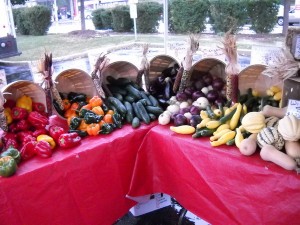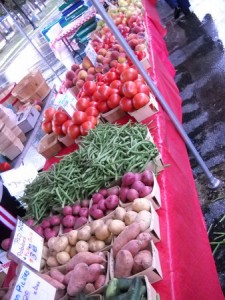Guest post by Alicia Howe
Hello, it’s great to meet new readers! I am a certified Health Coach working out of Illinois, and Dr. Chappus has graciously allowed me to share this guest post on his blog. We met via Twitter, where we began discussing organic versus local food.
The “organic versus local” argument is commonly discussed among health experts and enthusiasts. While I am all for organic, as is Dr. Chappus, I’d like to share some of the many benefits of eating local, and then how you can find local produce.
 Here are 5 benefits of eating local produce:
Here are 5 benefits of eating local produce:
1. It’s better for you. Local produce comes from small, family-owned farmers that still make a living the old-fashioned way. They tend to their own crops and pick the produce the night before or morning of selling it. In a store, produce is often picked before it ripens, so by the time it reaches its destination thousands of miles away, it will be ripe. That means local food is as fresh as you can find it, still with rich flavor and all of its nutrients and enzymes intact. As a living food, produce begins to lose its benefits with time.
2. It tastes better. As produce loses nutritional benefits with time, it also loses flavor! There is no denying that a locally purchased tomato has way more flavor than a store-bought tomato. First of all, it was just picked from the ground, and secondly, it’s in season. Many of the foods you find in your grocery store are not in season. Test it out. Try buying peaches, bell peppers, sweet corn, tomatoes or beets from a market and then from the grocery store, and see if you can’t tell the difference!
3. It’s naturally grown. Another reason that local produce is better for you is because it’s entirely natural. With grocery produce, that isn’t always the case. Unless the fruit or vegetable is grown organically, it probably contains pesticides and herbicides. It may also be waxed to make it look pretty and ripe. Bananas are often gassed to make them ripen faster. With local produce, it naturally ripens in the ground and is fresh for the eating!
4. It’s from a local farmer. The beauty of this is that you can talk directly to the person growing your food. You can ask if they use pesticides or fertilizers, and if they spray the fruits and vegetables directly or just on the plant early in the season. Many local farmers offer organic produce, which is obviously the best. But I have found that most farmers use minimal fertilizers and use it only before the crop appears.
5. It’s better for the environment. Even most of the organic produce from the grocery store has to travel hundreds or even thousands of miles. Think of all the hands that touch the food you put into your body. Think of all the gas it requires to send it. Think of the exhaust and pollution it travels through on its journey. Also, many farmers practice crop rotation, which is better for our soil and requires less pesticides and fertilizers.
Have I talked you into eating local yet? If you’d like to try the experiment of eating local foods versus those found in the grocery store, here is how to get your hands on local food:
 Farmers Markets. These community markets are popping up everywhere and have never been so popular. They allow local farmers an easy way to serve the people in their community. Local farmers gather at a certain time and location each week during the summer and/or fall to sell you seasonal items. The foods range from fruits and vegetables to cheeses, meats, eggs and baked goods.
Farmers Markets. These community markets are popping up everywhere and have never been so popular. They allow local farmers an easy way to serve the people in their community. Local farmers gather at a certain time and location each week during the summer and/or fall to sell you seasonal items. The foods range from fruits and vegetables to cheeses, meats, eggs and baked goods.
CSA. If you can’t make it to the farmers market each week, a CSA might be a better option. CSA stands for Community Supported Agriculture, and it means that you’re basically buying a “share” of a local farm. By doing so, the farm will send you a box of seasonal, local food each week. This way, all you have to do is open your front door and begin enjoying the local food with no hassle.
Farm Stands. Again, if you can’t make it to the farmers market, another option is to visit a farm stand. While you won’t get the variety of the market, you’ll still enjoy a variety of what that farmer has to offer. These stands are usually very affordable and conveniently located along major roads or in parking lots.
Hopefully this post has been an eye-opening lesson to the benefits of eating local!
 About
About
Alicia Howe is a certified health coach, having received her training from the Institute for Integrative Nutrition in New York. She followed the path of natural, holistic health and nutrition after suffering from ulcerative colitis flare-ups. Once she took the situation into her own hands, Alicia was able to control her symptoms and heal her body. Now, she helps clients all over the world take control of their health! Drawing on her education and experience, she helps her clients create a completely personalized “roadmap to health” that suits their unique bodies, lifestyles, preferences and goals.
Facebook: http://facebook.com/ForTheHealthOfIt
Twitter: http://twitter.com/ForTheHealth
Pinterest: http://pinterest.com/forthehealth/

